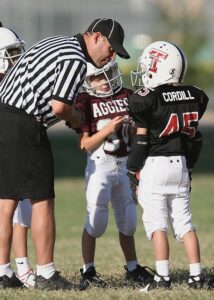
Eva
Sportsmanship and Family Activities
In our second installment of encouraging families to be active together this summer, we’re going to explore the idea of sportsmanship and how it plays into family activities – including how to approach attitude, heart, and discussions as you share healthy and fun activities. We’ll also discuss how you can share your activities with neighbors, friends, and extended family.
Sportsmanship in family activities
Sportsmanship is not just for team events; it’s often best learned first as an integral part of family activities. 
We’ve all been to a sporting event where someone, either in the stands, on the bench, or the field, loses their cool. Their actions often lead to very unsportsmanlike behavior. Observers might yell louder or start heckling, or a player might get a little more physical in their play.
While the outcome of any given game doesn’t always favor your team, it’s important to remember why you’re there (as an observer or participant), and that’s to enjoy the game and the people around you. And let’s face it; as a parent on the sidelines, if your athlete didn’t want to play the sport, you wouldn’t be there in the first place.
Being a good sport requires patience. No less should be expected when we participate in activities with our family.  Talking and sharing while we golf, walk, bowl, or fly a kite all require us to slow down and demonstrate patience. It’s helpful to keep in mind that we set out to have fun and bring some joy into our life. Keeping in mind God’s Grace can help us remember to summon that Grace ourselves before we comment to others.
Talking and sharing while we golf, walk, bowl, or fly a kite all require us to slow down and demonstrate patience. It’s helpful to keep in mind that we set out to have fun and bring some joy into our life. Keeping in mind God’s Grace can help us remember to summon that Grace ourselves before we comment to others.
Focus on the good
As you participate in a sporting or family activity, it can be easy to poke fun at each other’s skills and gameplay. There’s a certain amount of cultural approval for this type of behavior – it will “make us stronger” because we build up a wall of resistance to other’s opinions. This doesn’t need to be the default pattern, however.
Whether you’re playing a game with your family or with a school, church, or club team, you can commend your opponent for a good play and still enjoy the game – no bashing required to have fun! God loves it when we encourage and support each other. You can play hard and compete intensely for your side to win, but that victory doesn’t need to come by belittling others.
How to talk about sportsmanship with your family
“Treat others as you want to be treated” has been passed down for generations. It’s been taught to kids as the “Golden Rule,” which is adapted from Jesus’ words in Matthew 7:12 “So in everything, do to others what you would have them do to you, for this sums up the Law and the Prophets.” It’s a natural way to remember how we should interact with family members and others.
So how do you talk to your kids about treating people how they want to be treated … when parts of our society say everyone can do what feels right to them?
A biblical worldview can support this critical discussion. When you can help your kids understand how our culture has been shaped by biblical teaching can help them navigate their path into the greater world. There’s plenty of sin, ignorance, disregard, or apathy for God’s Word. It is powerful to remind them that the Bible can be our playbook for the game of life.
As our kids get older, they may not want to have deep conversations about being nice. They don’t necessarily want to talk about why God wants us to act in a respectful way toward each other. But these conversations help them build a foundation to rely on when the world starts heckling, yelling, and playing rough. As you talk about sportsmanship with your kids, bring it to their level with relatable examples.
For an elementary-age child, it’s helpful to remind them to take turns. They also have a hard time not being mad when they lose. And for some they need to tame their victory celebrations, so they’re not obnoxious and overbearing when they win. Remind them that there’s a winner and loser in any game or contest. As the saying goes, “on any given Sunday,” they could be on either side.
By the time they reach middle school, children may start to see their skills on a scale of better or worse than other players. It’s appropriate for them to feel proud of their accomplishments. However, there’s never a reason to make others feel bad about their skills or performance.
A child’s strong performance actually provides an excellent opportunity for them to teach by example. Encourage them to offer tips to a friend or teammate. Especially for things that have helped your child improve their own skills. Of course, this kind of help needs to come across with sensitivity and kindness, in the spirit of being supportive, not condescending.
In high school, many teenagers start to think they have it all figured out. When they are this age, it can be difficult to remind them about sportsmanship. Encourage them to be encouragers. Help them see their own and other’s skills as gifts for which they can be grateful. Help them to glorify God rather than pump up their ego. They will be better team members when they understand the fine line between arrogance and being thankful for what God has given each one of us.
So after you’ve paved the way for discussion with your kids, it’s time to get moving! Get out there as a family or invite others to join you in fun, high-energy activities.
How do you encourage others to be active?
After all of the pandemic-induced isolation, it’s finally time to break out of our shells. Time to get those heart rates up and enjoy the camaraderie of a game or other shared activity. According to a 2018 study by Science Daily, “A study of 1.2 million people in the USA has found that people who exercise report having 1.5 fewer days of poor mental health a month, compared to people who do not exercise.” If you know that your neighbor was alone a good part of last year, invite them to join your family for some outdoor fun.
Whatever you choose, it doesn’t always have to be a hard-charging game. Ask your neighbors or friends to take a walk or come over for a swim if you have a pool. Or head to a lake, get on your bike or pull out your gear for golf or tennis, if you know they enjoy them.
If you have yard games like croquet, badminton, bocce ball, beanbag toss, or other outdoor games, neighbors of all ages can participate with you and your kids. Exercise, fresh air, and good company are mood-enhancers for almost all of us.
participate with you and your kids. Exercise, fresh air, and good company are mood-enhancers for almost all of us.
Alternatively, host a cookout and invite them to spend time in fellowship. If they are believers, you could bring up conversations about how God worked in all of your lives this past year. You can share a little of your own story. If they are non-believers, you could pray over the meal and offer thoughts about how God sustained you through isolation. Ask questions and get to know them, and maybe Holy Spirit will give you an opening to introduce God’s Word.
With welcome summer weather upon us at last, why not get outside and enjoy God’s creation? Spend the time being active with family, friends, and neighbors – it’s good for your health and your soul!
Tell us about your experience this summer– have you adopted ways to bring God into your family activities? Comment and let us know.
To receive an encouraging word from The Ultimate Playbook—The Bible, sign up for our SportsFaith Plays of the Day. You’ll receive a daily email with a Bible verse and a small devotional to think on for the day.
SportsFaith is a Christ centered ministry that is focused on introducing people to God through sports. Our prayer is that God uses us to build a better team for Him. He has already provided the playbook (Bible), SportsFaith simply uses articles, interviews, video, audio, and impact events to share His message and make an impact that is positive and God honoring. Visit often, share our mission and help us make sure God is always calling the plays!
- 111-000-1111
- 416 George St, De Pere
- 00:00 - 00:00
Get Sportsfaith Sent Directly To you Faster!
Sign Up Today
© 2020 All Rights Reserved

